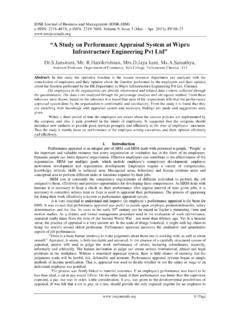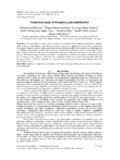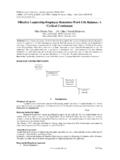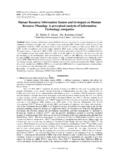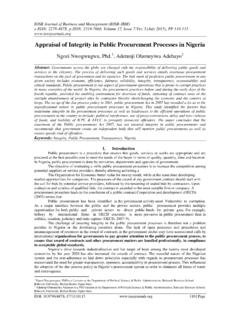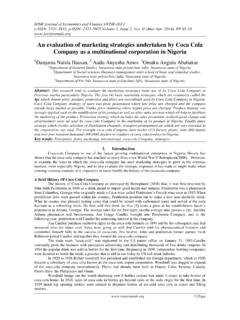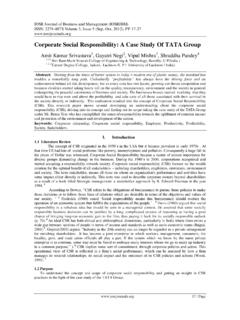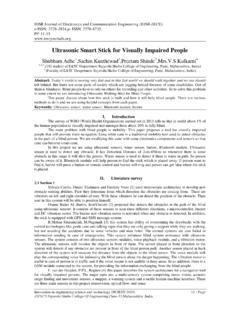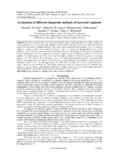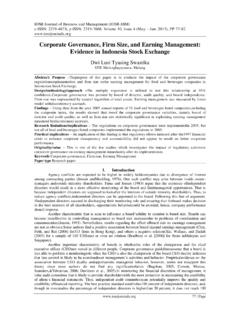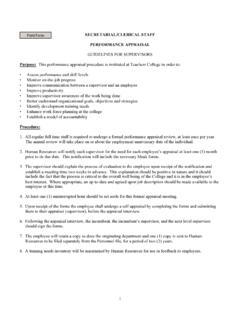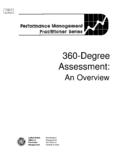Transcription of Role of Performance Appraisal System on Employees …
1 IOSR Journal of Business and Management (IOSR-JBM). e-ISSN: 8, Issue 4 (Mar. - Apr. 2013), PP 66-83. Role of Performance Appraisal System on Employees Motivation Muhammad Faseeh ullah khan (Lecturer Federal Urdu Art & Science University). Abstract: In many organizations, reward decisions depend on subjective Performance evaluations. However, evaluating an employee 's Performance is often difficult. In this paper, we develop a model in which the employee is uncertain about his own Performance and about the manager's ability to assess him.
2 The manager gives an employee a Performance Appraisal with a view of affecting the employee 's self perception, and the employee 's perception of the manager's ability to assess Performance . We examine how Performance appraisals affect the employee 's future Performance . The predictions of our model are consistent with various empirical findings. These comprise (i) the observation that managers tend to give positive appraisals, (ii) the finding that on average positive appraisals motivate more than negative appraisals, and (iii) the observation that the effects of appraisals depend on the employee 's perception of the manager's ability to assess Performance accurately.
3 Key Words: Subjective Performance Appraisal , Credibility, Cheap Talk I. Introduction 1 INTRODUCTION: MEANING AND DEFINITION OF Performance APPAISAL. Performance Appraisal is a formal System that evaluates the quality of an employee 's Performance . An Appraisal should not be viewed as an end in itself, but rather as and important process within a broader Performance management System that links: Organizational objectives Day to day Performance Professional development Rewards and incentives In simple terms, Appraisal may be understood as the assessment of an individual's Performance in a systematic way, the Performance being measured against such factors as job knowledge, quality and quantity of output, initiative, leadership abilities, supervision, dependability, cooperation, judgment, versatility, health and the like.
4 assessment should not be confirmed to past Performance alone. Potentials of the employee for future Performance must also be assessed. A formal definition of Performance Appraisal is: It is the systematic evaluation of the individual with respect to his or her Performance on the job and his or her potential for development.. A more comprehensive definition is: Performance Appraisal is a formal, structured System of meaning and evaluating an employee 's job related behaviors and outcome to discover how and why the employee is presently performing on the job and he the employee can perform more effectively in the future so that the employee , organization and society and all benefit.
5 OF STUDY. (A) Primary Objectives: 1) To study the Performance Appraisal System in different organization. 2) To study the transformation of Performance Appraisal from traditional to modern. 3) To get an insight into the relative importance of Performance Appraisal in organization. 4) To study the effectiveness of Performance Appraisal System in different organization. 5)To study the practical application of Performance Appraisal . 6) To compare Appraisal System of different organization and find out the most common parameters for Appraisal .
6 7) How can companies use Performance Appraisal as an effective tool to achieve organizational effectiveness and efficiency. 66 | Page Role Of Performance Appraisal System On Employees Motivation (B) Secondary Objectives: 1) To observe the work environment in organization. 2) To get experience and expertise in making projects. 3) To enhance my communication skills. 4) To increase my confidence. LIMITATION OF STUDY. 1) To get contacts of HR managers for interviews was difficult. 2) Getting the views and opinion of the interviewee (HR Manager) was a difficult task.
7 II. Literature Review 2 LITERATURE REVIEW. Performance appraisals are a systematic way of evaluating the standard of an employee 's Performance . Steps for developing a systematic Performance appraisals Identify key Performance criteria Development of key Performance criteria should be based on a comprehensive job description and undertaken in consultation with Employees . Develop appraisals measure In order to obtain accurate and valid Performance appraisals, appraisals measures should be tailored to the specific job or job family ( , groups of similar jobs).
8 An evolution of factors in the work environment which help or hinder Performance is also recommended. This ensures that realistic expectations are set for employee 's Performance . And is also likely to increase the perceived fairness and acceptability of Performance appraisals. Collect Performance information from different sources Traditionally, it has been the sole responsibility of managers/supervisors to assess Performance . However, other organizational members ( , clients, coworkers, and subordinates) can be valuable source of information as they are likely to have exposure to different aspects of an employee 's Performance .
9 Collecting information from multiple sources can increase the accuracy of Performance evaluation ( , reduce bias), and increase employee 's perceptions of fairness. Conduct an Appraisal interview The two central purposes of the Appraisal interview are to: 1. Reflect on past performances to identify major achievement, areas for further improvement, and barriers/facilitators to effective are Performance . 2. Identify goals and strategies for future work practice. The Appraisal interview should be a constructive, two-way exchange between the supervisor and employee , with preparation for the interview done by both parties beforehand.
10 Evaluate the Appraisal process The Performance Appraisal process should undergo regular review and improvement. For example, focus groups or surveys could be conducted to gauge employee 's perceptions of the Appraisal process. A success Performance Appraisal process should demonstrate a change in both the rating of employee 's Performance and aspects of the work environment that impact upon work Performance . Best practice in Performance Appraisal In essence, best practice in Performance , appraisals involves: Integrating Performance Appraisal into a formal goal setting System Basting appraisals on accurate and current job descriptions Offering adequate support and assistance to Employees to improve their Performance ( , professional development opportunities).
